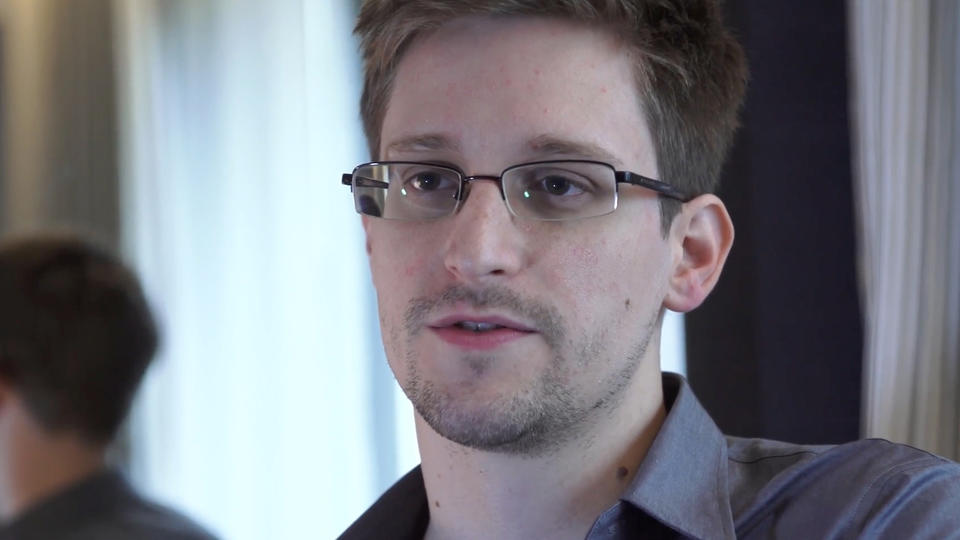CITIZENFOUR
Cinetic Media
Reviewed for Shockya by Harvey Karten. Data-based on Rotten Tomatoes.
Grade: B
Director: Laura Poitras
Screenwriter: Laura Poitras
Cast: Edward Snowden, Glenn Greenwald, William Binney, Ewen Macaskill, Jacob Applebaum, Jeremy Scahill
Screened at: Review, NYC, 10/15/14
Opens: October 24, 2014
Am I risking life and limb by reviewing Laura Poitras’s “Citizenfour,” the third in a trilogy of documentaries that cover what the director believes to be inequities in the U.S. government? According to this doc, which focuses largely but not exclusively on whistleblower Edward Snowden, our government has assumed the power to spy on us without the need for warrants. The U.S. may look at our emails, listen to our phone-calls, look into our Facebook, Linkedin, Instagram, iPhone texts, sexts, you name it. If the government believes that any of us are terrorists, prosecutions may take place or at any rate harassments such as detention for hours at airports. So…since “Citizenfour” has a director who is in essence herself a whistleblower, might the U.S. have not only her on its list of suspects but also anyone who has contact with her, even those who write reviews—particularly if those reviews are laudatory?
But OK I’ll take the chance. Like the vast majority of us, I have nothing to hide. As one Hochhäuser, another person upset by government policy, states in a New Yorker magazine article about Laura Poitras in the Oct. 20, 2014 issue, “Because most of the people think, ‘Yes, but it won’t happen to me, and, anyway, I have nothing to hide.’ It’s always the same argument.” However he does not follow up to show that such a viewpoint is not a moral one. We should be concerned, he implies, even if we don’t think we will ever have anything to hide, because our country was founded on civil liberties, and one of those implied liberties is the right of privacy.
Laura Poitras’s previous docs are “Oath” (two men have an encounter that will lead them to Afghanistan), and “My Country, My Country” (a Sunni Arab doctor runs for office in the 2005 election). This time she films meetings particularly with Edward Snowden in a Hong Kong hotel where he stayed for a few months before heading to Russia, at which point he was recently granted a year’s asylum. While interviewed by Ewen MacAskill, a U.K. intelligence journalist, and principally by Glenn Greenwald, an American journalist who now resides in Rio, Snowden casually walks to the window several times to observe the Hong Kong skyline, washes up and takes a shave, and answers questions while pecking away at a laptop computer while sitting in yoga-like positions on the hotel bed. Snowden, who had worked as a systems engineer, was able to haul away significant documentation about the government surveillance techniques. Snowden believes that it is the job of journalists, and not his, to determine what may be revealed in the press without compromising national security.
While a clip shows President Obama revealing his belief that Snowden is no patriot, Poitras herself avoids making him into a hero in favor of simply documenting the man’s character without hiding Snowden’s paranoia (the whistleblower sometimes hides under a blanket).
Though Snowden had every reason to avoid becoming a whistleblower—a girlfriend, Lindsay Mills who he left in Hawaii but who visits him in Moscow and a good job at age twenty-nine—he expresses a powerful belief in what he is doing, which is to help put the brakes on (he thinks) America’s slide into authoritarianism. Neither Hong Kong nor Russia has had any interest in returning him forcefully to face U.S. prosecution, so while he holes up in a Moscow flat (seen through a window cooking soup with his girlfriend), Greenwald becomes his spokesperson, leading press conferences abroad. Before leaving Snowden, however, Greenwald shows Snowden revelations even more serious than those previously uncovered, then tears the paper into little bit, the camera revealing only “POTUS” (President of the United States).
While some critics have called the documentary “riveting,” “like a John Le Carré spy story,” “Citizenfour,” which received exposure at festivals such as one in New York, is dry, involving conversations with the director always in the background. There’s little doubt that we learn much from the coverage, but one would hope that some of Michael Moore’s touch would lighten the humorless documentation.
Unrated 114 minutes. © Harvey Karten, Member, New York Film Critics Online
Story – B+
Acting – B
Technical – C+
Overall – B

